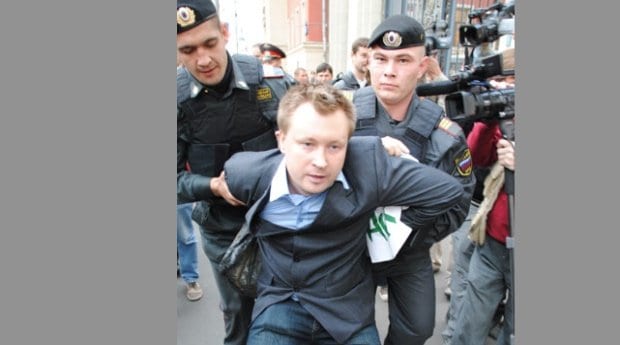In an Aug 24 piece published on the RT website, gay rights activist Nikolai Alexeyev rejects the push by “Western activists” for a boycott of the Sochi Winter Games next year, arguing that it won’t make the lives of queer Russians and their advocates any better, nor will it lead to a repeal of his country’s anti-gay federal law.
Even though Russia’s LGBT community and major advocacy organizations like gayrussia.ru, Moscow Pride, Equality, Vykhod (Out) and the Russian LGBT Network have all dismissed the idea of a boycott, Alexeyev says it is still being “actively promoted” in the West.
“A Sochi Olympics boycott will only serve those who do not understand that their goal will only further isolate the LGBT community in Russia and make the lives of its representatives living in the country (and not in New York or London) even harder,” he explains.
“The international community would be much more effective if it listened to the activists on the ground, and brought to justice those who are directly involved in stirring up homophobic hysteria in Russia,” Alexeyev contends in the RT piece.
Alexeyev says the irony of the introduction of the anti-gay gag laws first in several Russia cities and regions, followed by the federal measure that Putin signed into law in June, is that they are helping to lend visibility to the local queer community’s human-rights fight — and so can the Olympics, he says.
“The Olympics is a unique possibility for the Russian LGBT community and the world to be present and have their voice heard. Despite the fact that there will be no official Pride House, unlike in Vancouver and London, and no authorized Gay Pride march during the forthcoming event in February, the Sochi Olympics have a chance to become the gayest ever in the history of the Olympic movement, and the bans on Pride House and the introduction of the gay propaganda laws has actually only helped.”
He continues, “These laws, especially the one passed at federal level, actually gave a boost to the LGBT fight in Russia. More activists are now protesting in various cities. Look at St Petersburg, Kazan, Ekaterinburg, Novosibirsk, Kostroma and Syktyvkar. The topic is being widely discussed in the media. This was unthinkable in 2005 when we started. The effect is directly opposite to what the authors of those initiatives wanted to reach. They are promoting gay propaganda in Russia more than any LGBT activist.”
It’s an argument Alexeyev has made on a number of occasions.
In an interview with Xtra last year, both Alexeyev and Polina Savchenko, the head of the grassroots St Petersburg organization Coming Out, observed that the gay propaganda laws — and the protests, subsequent arrests and media coverage they provoke — are proving to be a huge boon to the Russian gay rights movement.
“In Russia, the biggest promoters of LGBT rights and the biggest promoters of homosexuality are people who are talking against it,” Alexeyev told Xtra.
Savchenko agreed, noting that the sanction that propaganda measures gave various cities to legally discriminate against queer people — despite the decriminalization of homosexuality in 1993 — is not necessarily a bad thing.
“Before there was no official discrimination against gay people, but unofficial discrimination was happening all the time. It’s hard to fight against something that’s not defined,” Savchenko explained. “Now it’s been legitimized by the state, we have very concrete things to fight against, and we have concrete ways of doing it. One would be litigation, of course.”
The litigation route is one Alexeyev has taken full advantage of in his years of activism, whether it’s appealing the successive Moscow Pride bans to the European Court of Human Rights or challenging the propaganda laws in the local courts and, if necessary, internationally.
Alexeyev points to the partially successful challenge of the gay propaganda law in the Ryazan region, noting that the UN Human Rights Committee last year found the Ryazan legislation discriminatory and called on Russian authorities to repeal it.
“It will take time and we are continuing our fight for this final step in our battle,” Alexeyev writes in RT.
“On top of that, we have three dozen other cases pending at the European Court, covering virtually all aspects of LGBT rights violations in Russia — widespread bans of public events, denials to register NGOs, including ‘Pride House Sochi’ and ‘MarriageEquality,’ hate speech, gay propaganda bans and marriage rights,” he adds.
Putting anti-gay politicians on an international travel blacklist would also be an effective strategy to “hit politicians where it will hurt them the most,” he suggests.
“The example of those politicians on the visa ban list would make others think. After all, many of them have their direct interests abroad, including real estate, holidays and children studying in the best institutions in the world.”
He criticizes the focus of an AllOut petition to the International Olympic Committee (IOC) that garnered more than 300,000 signatures.
“The IOC has not moved one finger in our direction. They only swallowed the Russian official position on gay propaganda law, which will stay in force during the Olympics whatever is being said,” he says.
“Can you believe what would have been the effect of the same 300,000 letters to the European Court calling to open and consider the case of Russian gay propaganda laws?”
Alexeyev concludes, “Millions of Russian LGBTs have to and will continue to live in their Russian reality and it is them who need help in their fight for equality and better life. And we will continue this fight on the ground, with or without the support of the international community. The laws banning homosexual propaganda will be repealed, as they are now on the wrong side of history.”


 Why you can trust Xtra
Why you can trust Xtra


